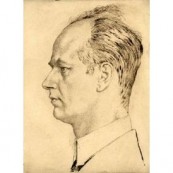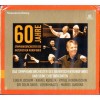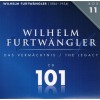Composers
Wilhelm Furtwängler (January 25, 1886 – November 30, 1954) was a German conductor and composer. He is considered to be one of the greatest symphonic and operatic conductors of the 20th century.
Furtwängler was principal conductor of the Berlin Philharmonic between 1922 and 1945, and from 1952 until 1954. He was also principal conductor of the Gewandhaus Orchestra (1922–26), and was a guest conductor of other major orchestras including the Vienna Philharmonic.
He was the leading conductor to remain in Germany during the Second World War, although he was not an adherent to the Nazi regime.[1] This decision caused lasting controversy, and the extent to which his presence lent prestige to the Third Reich is still debated.
Furtwängler's conducting is well documented in commercial and broadcast recordings and has contributed to his lasting reputation. He had a major influence on many later conductors, and his name is often mentioned when discussing their interpretive styles
Recently Added
Biography
Wilhelm Furtwängler (January 25, 1886 – November 30, 1954) was a German conductor and composer. He is considered to be one of the greatest symphonic and operatic conductors of the 20th century.
Furtwängler was principal conductor of the Berlin Philharmonic between 1922 and 1945, and from 1952 until 1954. He was also principal conductor of the Gewandhaus Orchestra (1922–26), and was a guest conductor of other major orchestras including the Vienna Philharmonic.
He was the leading conductor to remain in Germany during the Second World War, although he was not an adherent to the Nazi regime.[1] This decision caused lasting controversy, and the extent to which his presence lent prestige to the Third Reich is still debated.
Furtwängler's conducting is well documented in commercial and broadcast recordings and has contributed to his lasting reputation. He had a major influence on many later conductors, and his name is often mentioned when discussing their interpretive styles




